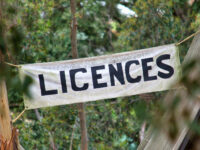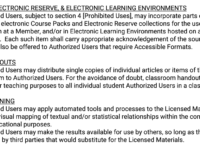Last month, the Canadian Federation of Library Associations released a much-needed statement that sought to counter the ongoing misinformation campaign from copyright lobby groups regarding the state of Canadian copyright and the extensive licensing by libraries and educational institutions. I had no involvement whatsoever with the statement, but was happy to tweet it out and was grateful for the effort to set the record straight on what has been a relentless misinformation campaign that ignores the foundational principles of copyright law. Lobby groups have for years tried to convince the government that 2012 copyright reforms are to blame for the diminished value of the Access Copyright licence that led Canadian educational institutions to seek other alternatives, most notably better licensing options that offer greater flexibility, access to materials, and usage rights. This is false, and when the CFLA dared to call it out, those same groups then expressed their “profound disappointment” in the library association.
Post Tagged with: "access copyright"
Canadian Copyright, Fair Dealing and Education, Part Six: A Fair Reading of Fair Dealing
My Fair Dealing Week series of posts on Canadian copyright, fair dealing, and education concludes with a few thoughts on the role of fair dealing within Canadian universities and colleges. Copyright lobby groups have spent years perpetuating multiple myths, including the false notion that today’s fair dealing policies are largely a function of 2012 reforms (they actually stem chiefly from two decades of Supreme Court jurisprudence) and that fair dealing has resulted in universities refusing to licence content (prior posts have covered this disinformation, citing the millions spent on site licensing, transactional licensing , the disappearance of course packs, and the growth of open textbooks).
Canadian Copyright, Fair Dealing and Education, Part Four: The Disappearance of Course Packs
Canadian copyright lobby groups effort to persuade the government to restrict fair dealing has often focused on a particular use case: the course pack. For many years, course packs were used by university and college professors to pull together a customized collection of reading materials for their courses. The course packs were copied and typically sold as an alternative to course textbooks. Copyright lobby groups and their supporters have long claimed that the practice relies on fair dealing and that universities are profiting from copying without compensation. My Fair Dealing Week series on Canadian copyright, fair dealing, and education (Setting the Record Straight, The Massive Shift to Electronic Licensing, Millions Spent on Transactional Licences Demonstrate Fair Dealing is No Free for All) continues with a look at what has actually happened with data demonstrating the printed course packs have all but disappeared from university campuses.
Canadian Copyright, Fair Dealing and Education, Part Three: Millions Spent on Transactional Licences Demonstrate Fair Dealing is No Free For All
Canadian copyright lobby groups have repeatedly tried to convince the government that the 2012 copyright reforms and Supreme Court fair dealing jurisprudence created a free-for-all in which education refuses to pay licence fees due to their reliance on fair dealing. The data from yesterday’s post on massive shift to site licences tells a different story, namely that Canadian educational institutions spend hundreds of millions annually on licences that provide both access works and the flexibility to use them in a myriad of ways. My Fair Dealing Week series on Canadian copyright, fair dealing and education (Setting the Record Straight) continues with another type of licence that has grown in importance in recent years: the pay-per-use or transactional licence. These licences, which grant access to, and use of, individual works, demonstrate that lobby group claims bear little relationship to reality. Indeed, if the lobby groups were right about unlimited uncompensated copying, why would education still spend millions a pay-per-use licences? They obviously wouldn’t, but since fair dealing represents a fair approach to both creators and users, education recognizes that fair dealing does not lead to the complete elimination of licensed copying.
Canadian Copyright, Fair Dealing and Education, Part Two: The Massive Shift to Electronic Licensing
Canadian copyright lobby groups have spent years falsely claiming that educational institutions refuse to pay for licences to compensate for the use of educational materials. This second post in my Fair Dealing Week series on Canadian copyright, fair dealing, and education focuses on this claim, which is a gross misrepresentation of the data (first post on Setting the Record Straight). The truth is that Canadian universities spend millions of dollars on licensing copyright materials. In fact, over the past decade, the emergence of site licenses that provide access to millions of works – books, journal articles, newspapers, and more – has led to huge increases in expenditures for access. Unlike copyright licences from copyright collectives such as Access Copyright, these digital licences provide both original access to works and the ability to use them in course materials. In the 1990s, a university would both purchase a book and pay for the right to copy a portion of it to distribute to students as course materials. Today, the university can use a single licence to gain access to the book and make it available as course material, handouts and for many other purposes since most digital licences facilitate access and permit multiple uses.











